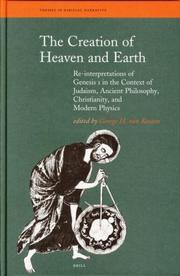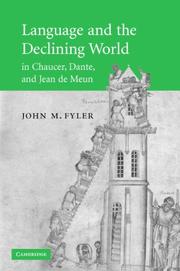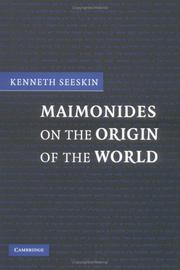| Listing 1 - 5 of 5 |
Sort by
|
Book
ISBN: 1575066548 9781575066547 157506216X 9781575062167 9781575062167 Year: 2011 Publisher: Winona Lake, Ind : Eisenbrauns,
Abstract | Keywords | Export | Availability | Bookmark
 Loading...
Loading...Choose an application
- Reference Manager
- EndNote
- RefWorks (Direct export to RefWorks)
The ancient Near Eastern mode of thought is not at all intuitive to us moderns, but our understanding of ancient perspectives can only approach accuracy when we begin to penetrate ancient texts on their own terms rather than imposing our own world view. In this task, we are aided by the ever-growing corpus of literature that is being recovered and analyzed.After an introduction that presents some of the history of comparative studies and how it has been applied to the study of ancient texts in general and cosmology in particular, Walton focuses in the first half of this book on the ancient Near Eastern texts that inform our understanding about ancient ways of thinking about cosmology. Of primary interest are the texts that can help us discern the parameters of ancient perspectives on cosmic ontology—that is, how the writers perceived origins. Texts from across the ancient Near East are presented, including primarily Egyptian, Sumerian, and Akkadian texts, but occasionally also Ugaritic and Hittite, as appropriate. Walton’s intention, first of all, is to understand the texts but also to demonstrate that a functional ontology pervaded the cognitive environment of the ancient Near East. This functional ontology involves more than just the idea that ordering the cosmos was the focus of the cosmological texts. He posits that, in the ancient world, bringing about order and functionality was the very essence of creative activity. He also pays close attention to the ancient ideology of temples to show the close connection between temples and the functioning cosmos.The second half of the book is devoted to a fresh analysis of Genesis 1:1–2:4. Walton offers studies of significant Hebrew terms and seeks to show that the Israelite texts evidence a functional ontology and a cosmology that is constructed with temple ideology in mind, as in the rest of the ancient Near East. He contends that Genesis 1 never was an account of material origins but that, as in the rest of the ancient world, the focus of “creation texts” was to order the cosmos by initiating functions for the components of the cosmos. He further contends that the cosmology of Genesis 1 is founded on the premise that the cosmos should be understood in temple terms. All of this is intended to demonstrate that, when we read Genesis 1 as the ancient document it is, rather than trying to read it in light of our own world view, the text comes to life in ways that help recover the energy it had in its original context. At the same time, it provides a new perspective on Genesis 1 in relation to what have long been controversial issues. Far from being a borrowed text, Genesis 1 offers a unique theology, even while it speaks from the platform of its contemporaneous cognitive environment.
Biblical cosmology. --- Cosmogony. --- Cosmology --- Cosmology, Biblical --- Creation --- Bible. --- Gen 1 (Book of the Old Testament) --- Genesis 1 (Book of the Old Testament) --- Criticism, interpretation, etc. --- Biblical cosmology --- Cosmogony --- 222.2 --- 291.217 --- 291.217 Cosmogonie. Strijd van de goden onder elkaar en tegen de mens --- Cosmogonie. Strijd van de goden onder elkaar en tegen de mens --- Genesis --- Weltbild. --- Exegese. --- Genesis 1. --- Alter Orient.

ISBN: 9004142355 9786610867547 1429452668 9047406893 128086754X 1433704390 9789004142350 9781429452663 Year: 2005 Volume: 8 Publisher: Leiden; Boston : BRILL,
Abstract | Keywords | Export | Availability | Bookmark
 Loading...
Loading...Choose an application
- Reference Manager
- EndNote
- RefWorks (Direct export to RefWorks)
This volume discusses the narrative of the creation of heaven, earth and light in the first chapter of Genesis and focuses extensively on its later interpretations in different cultural and religious contexts. After an introductory paper on the text of Genesis itself, the authors deal with receptions of this theme in the Prophet Jeremiah, Early Judaism, and the Dead Sea Scrolls. They comment on creation accounts in the Ancient Near East, Ancient Greece and ancient philosophy, reconstructing the earliest known receptions of Genesis 1 in ancient philosophers like Numenius and Galen. They trace its influence in the Johannine, Petrine and Pauline traditions of Early Christianity, and follow it right through the Middle Ages up till the present-day discussion of design in Nature.
Creation --- Biblical cosmology --- Cosmology --- Biblical teaching --- History --- Bible. --- Criticism, interpretation, etc. --- -Biblical cosmology --- -Cosmology --- -222.2 --- Astronomy --- Deism --- Metaphysics --- Cosmology, Biblical --- Biblical cosmogony --- Cosmogony --- Natural theology --- Teleology --- Beginning --- Creation windows --- Creationism --- Evolution --- -Congresses --- -Genesis --- Bible --- -Bible --- -Criticism, interpretation, etc. --- -Creation --- 222.2 --- Genesis --- Ba-yon Tipan --- Bagong Tipan --- Jaji ma Hungi --- Kainē Diathēkē --- New Testament --- Nouveau Testament --- Novo Testamento --- Novum Testamentum --- Novyĭ Zavet --- Novyĭ Zavi︠e︡t Gospoda nashego Īisusa Khrista --- Novyĭ Zavit --- Nuevo Testamento --- Nuovo Testamento --- Nye Testamente --- Perjanjian Baru --- Dhamma sacʻ kyamʻʺ --- Injīl --- Gen 1 (Book of the Old Testament) --- Genesis 1 (Book of the Old Testament)

ISBN: 9780521872157 0521872154 9780511627446 9780521147712 9781107322080 1107322081 0511627440 9781107316690 1107316693 1107197740 9781107197749 1139810650 9781139810654 1107317657 9781107317659 1107318572 9781107318571 1299399762 9781299399761 1107315735 9781107315730 0521147719 Year: 2007 Volume: 63 Publisher: Cambridge : Cambridge University Press,
Abstract | Keywords | Export | Availability | Bookmark
 Loading...
Loading...Choose an application
- Reference Manager
- EndNote
- RefWorks (Direct export to RefWorks)
Medieval commentaries on the origin and history of language used biblical history, from Creation to the Tower of Babel, as their starting-point, and described the progressive impairment of an originally perfect language. Biblical and classical sources raised questions for both medieval poets and commentators about the nature of language, its participation in the Fall, and its possible redemption. John M. Fyler focuses on how three major poets - Chaucer, Dante, and Jean de Meun - participated in these debates about language. He offers fresh analyses of how the history of language is described and debated in the Divine Comedy, the Canterbury Tales and the Roman de la Rose. While Dante follows the Augustinian idea of the Fall and subsequent redemption of language, Jean de Meun and Chaucer are skeptical about the possibilities for linguistic redemption and resign themselves, at least half-comically, to the linguistic implications of the Fall and the declining world.
Language and languages --- Langage et langues --- History --- Histoire --- Chaucer, Geoffrey, --- Dante Alighieri, --- Jean, --- Bible. --- Criticism, interpretation, etc. --- Historical linguistics --- Diachronic linguistics --- Dynamic linguistics --- Evolutionary linguistics --- Language and history --- Linguistics --- Chaucer, Jeffrey, --- Chʻiao-sou, Chieh-fu-lei, --- Chieh-fu-lei Chʻiao-sou, --- Choser, Dzheffri, --- Choser, Zheoffreĭ, --- Cosvr, Jvoffrvi, --- Tishūsar, Zhiyūfrī, --- Dante Alighieri --- Alighieri, Dante --- Dante, Alighieri --- Alih'eri, Dante --- Chopinel, Jean, --- Clopinel, Jean, --- De Meun, Jean, --- Jean Chopinel de Meun, --- Jean Clopinel de Meun, --- Jean de Meun, --- Jehan, --- Meun, Jean de, --- Clopinel, J. --- Gen 1 (Book of the Old Testament) --- Genesis 1 (Book of the Old Testament) --- Alihii︠e︡ri, Dante, --- Alaghieri, Dante, --- Aldigeri, Dante, --- Aligeri, Dante, --- Allighieri, Dante, --- Aligerius, Dantes, --- Aligheri, Dante, --- Alighieri, Dante, --- Alleghieri, Dante, --- Durante Alighieri, --- Tan-ting, --- Danding, --- Dāntī Alījyīrī, --- Alīyīrī, Dāntī, --- Dante Alih'i︠e︡ri, --- Dante, --- Dant Aligīeri, --- Aligīeri, Dant, --- Dantte, --- Tantte, --- Dantis Alagherius, --- Danthe Alighieri, --- Alighieri, Danthe, --- Dante Alig'i︠e︡ri, --- Alig'i︠e︡ri, Dante, --- Ailígiéirí, Dainté, --- Dantė Aligjeris, --- Dānté ʼAligiyéri, --- Makākavi Tāntē, --- Tāntē Alikiyari, --- Alikiyari, Tāntē, --- אליגיירי דנטי --- אליגירי, דנטי --- דאנטי אליגיירי --- דאנטי אליגיירי, --- דאנט, --- דנטה אליגיירי, --- דנטה אליגירי, --- דנטי אליגיארי, --- דנטי אליגירי, --- دانتى ألغييري --- دانتي أليجيري،, --- ダンテ, --- Данте Аліґгіері, --- Historical linguistics. --- Arts and Humanities --- Literature
Book
ISBN: 9789004396920 9004396926 9789004396937 9004396934 Year: 2019 Volume: 14 Publisher: Boston : Brill,
Abstract | Keywords | Export | Availability | Bookmark
 Loading...
Loading...Choose an application
- Reference Manager
- EndNote
- RefWorks (Direct export to RefWorks)
In Genesis and Cosmos Adam Rasmussen examines how Basil and Origen addressed scientific problems in their interpretations of Genesis 1. For the first time, he offers an in-depth analysis of Basil’s thinking on three problems in Scripture-and-science: the nature of matter, the super-heavenly water, and astrology. Both theologians worked from the same fundamental perspective that science is the “servant” of Christianity, useful yet subordinate. Rasmussen convincingly shows how Basil used Origen’s writings to construct his own solutions. Only on the question of the water does Basil break with Origen, who allegorized the water. Rasmussen demonstrates how they sought to integrate science and Scripture and thus remain instructive for those engaged in the dialogue between religion and science today.
Cosmology, Ancient --- Cosmogony --- Religion and science --- Basil, --- Origen --- Adamantius, --- Oregenes Adamantius, --- Origene --- Origenes Adamantius, --- Origenes, --- Origenis --- Orygenes --- Ūrījānūs --- Barsegh, --- Basile, --- Basileios, --- Basili, --- Basilio, --- Basilius Caesariensis, --- Basilius Cesariensis, --- Basilius, --- Bāsīliyūs, --- Bazyli, --- Magnus Basilius, --- Qiddīs Bāsīliyūs al-Kabīr, --- Vasile, --- Vasileios, --- Vasiliĭ, --- Vasilije, --- Vasyliĭ, --- Influence. --- Bible. --- Gen 1 (Book of the Old Testament) --- Genesis 1 (Book of the Old Testament) --- Criticism, interpretation, etc. --- Christianity and science --- Geology --- Geology and religion --- Science --- Science and religion --- Cosmology --- Ancient cosmology --- Religious aspects --- 215 --- 222.2 --- 276 =75 BASILIUS MAGNUS --- 276 =75 ORIGENES --- 276 =75 BASILIUS MAGNUS Griekse patrologie--BASILIUS MAGNUS --- 276 =75 BASILIUS MAGNUS Patrologie grecque--BASILIUS MAGNUS --- Griekse patrologie--BASILIUS MAGNUS --- Patrologie grecque--BASILIUS MAGNUS --- 276 =75 ORIGENES Griekse patrologie--ORIGENES --- 276 =75 ORIGENES Patrologie grecque--ORIGENES --- Griekse patrologie--ORIGENES --- Patrologie grecque--ORIGENES --- 222.2 Genesis --- 222.2 La Genese --- Genesis --- La Genese --- 215 Godsdienst en wetenschap --- 215 Religion et science --- Godsdienst en wetenschap --- Religion et science --- Cosmology, Ancient. --- Cosmogony. --- Religion and science. --- Origen. --- Pseudo-Basil

ISBN: 052184553X 0521697522 1107152100 0511348762 0511347790 1281085731 9786611085735 0511349688 0511350562 0511182007 0511130406 051130935X 0511614624 128042219X 0511199163 0511128878 9780521845533 9780511130403 9780511349683 9780511348761 9780511614620 9781281085733 9780521697521 9781107152106 9780511350566 6611085734 9780511347795 9780511182006 9780511199165 9780511128875 Year: 2005 Publisher: Cambridge : Cambridge University Press,
Abstract | Keywords | Export | Availability | Bookmark
 Loading...
Loading...Choose an application
- Reference Manager
- EndNote
- RefWorks (Direct export to RefWorks)
Although Maimonides' discussion of creation is one of his greatest contributions - he himself claims that belief in creation is second in importance only to belief in God - there is still considerable debate on what that contribution was. Kenneth Seeskin takes a close look at the problems Maimonides faced and the sources from which he drew. He argues that Maimonides meant exactly what he said: the world was created by a free act of God so that the existence of everything other than God is contingent. In religious terms, existence is a gift. In order to reach this conclusion, Seeskin examines Maimonides' view of God, miracles, the limits of human knowledge, and the claims of astronomy to be a science. Clearly written and closely argued, Maimonides on the Origin of the World takes up questions of perennial interest.
Creation. --- Philosophy, Ancient. --- Philosophy, Medieval. --- Jewish philosophy --- Création --- Philosophie ancienne --- Philosophie médiévale --- Philosophie juive --- Maimonides, Moses, --- Bible. --- Criticism, interpretation, etc., Jewish. --- Philosophy, Jewish. --- Création --- Philosophie médiévale --- Creation --- Philosophy, Ancient --- Philosophy, Medieval --- Medieval philosophy --- Scholasticism --- Ancient philosophy --- Greek philosophy --- Philosophy, Greek --- Philosophy, Roman --- Roman philosophy --- Jews --- Philosophy, Jewish --- Philosophy, Israeli --- Biblical cosmogony --- Cosmogony --- Natural theology --- Teleology --- Beginning --- Biblical cosmology --- Creation windows --- Creationism --- Evolution --- Philosophy --- Maïmonide, Moïse, --- Májmúni, Móse, --- Maimonides, --- Maimonid, --- Rambam, --- Mûsâ Maimûnî, --- Maimûnî, Mûsâ, --- Ibn Maymūn, Mūsá, --- Mosche ben Maimun, --- Maimonide, Mosè, --- Moses ben Maimon, --- Mosheh ben Maimon, --- Maymūn, Mūsá ibn, --- Maimon, Moses ben, --- Maimon, Mosheh ben, --- Mūsá ibn Maimūn, --- Maimun, Mosche ben, --- Moshe ben Maimon, --- Maimon, Moshe ben, --- Mosheh bar Maimon, --- Maimon, Mosheh bar, --- Mose ben Maimon, --- Maimon, Mose ben, --- Qurṭubī, Mūsá ibn Maymūn, --- Andalusī, Mūsá ibn Maymūn, --- Ram, --- Ram Bam, --- Mozes ben Maimon, --- Maimonides, Mozes, --- Maimoides, --- Mosheh, --- Maimoni, Mosheh, --- א. חיים --- בן מיימון, משה, --- בן מימון, משה --- בן מימון, משה, --- בן־מיימון, משה --- הרמב״ם --- הרמב״ם, --- יונה מגירונדי --- כ״ץ, אלי --- מושה בן מיימון, --- מיימון --- מיימון, משה --- מיימון, משה בר, --- מיימון, משה, --- מיימון, צשה בן --- מיימוני --- מיימוני, משה --- מימון, גד --- מימון, משה --- מימון, משה בן, --- מימון, משה, --- מימונידס, משה --- ממימון, משה --- משה בו מימון --- משה בון מימון, --- משה במן מימון --- משה בן מיימון --- משה בן מיימון, רמב״ם, 1135־1204 --- משה בן מיימון, רמב״ם, --- משה בן מיימון, --- משה בן מימון --- משה בן מימון־־משנה תורה־־הלכות תשובה־־פירושים --- משה בן מימון, --- משה בן מימון--משנה תורה--הלכות דעות--פירושים --- משה בן מימון.משנה תורה --- משה בן מימון.משנה תורה־־באורים --- משה בן מימין, --- משה בן מימן --- משה בן מימן, --- משה בר מיימון --- משה בר מיימון, --- משה בר מימון --- משה בר מימון, --- משה בר מײמון רמב״ם, --- משה ברבי מיימון --- משה נן מיימוני, --- משה נן מימון --- משה קן מימון, --- משה, המיימוני --- פרנקל, שבתי, --- רבמ״ם --- רבנו משה בן מיימון, --- רמב"ם --- רמב״ם, --- ר״מ --- ابن ميمون، موسى --- ابن ميمون، موسى، --- Gen 1 (Book of the Old Testament) --- Genesis 1 (Book of the Old Testament) --- Arts and Humanities --- Religion --- Maimonides, Moses, - 1135-1204. --- Jewish philosophy.
| Listing 1 - 5 of 5 |
Sort by
|

 Search
Search Feedback
Feedback About
About Help
Help News
News